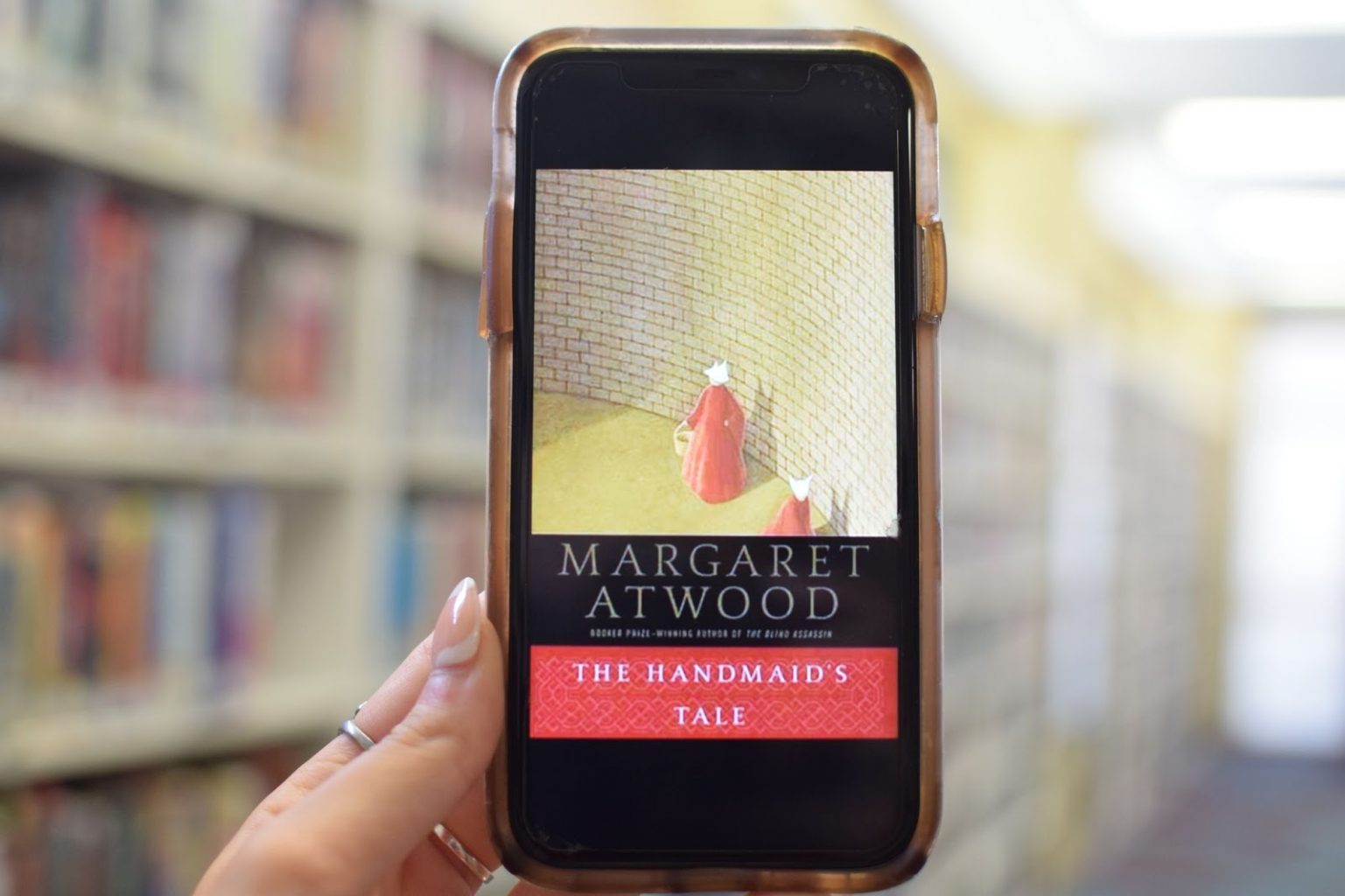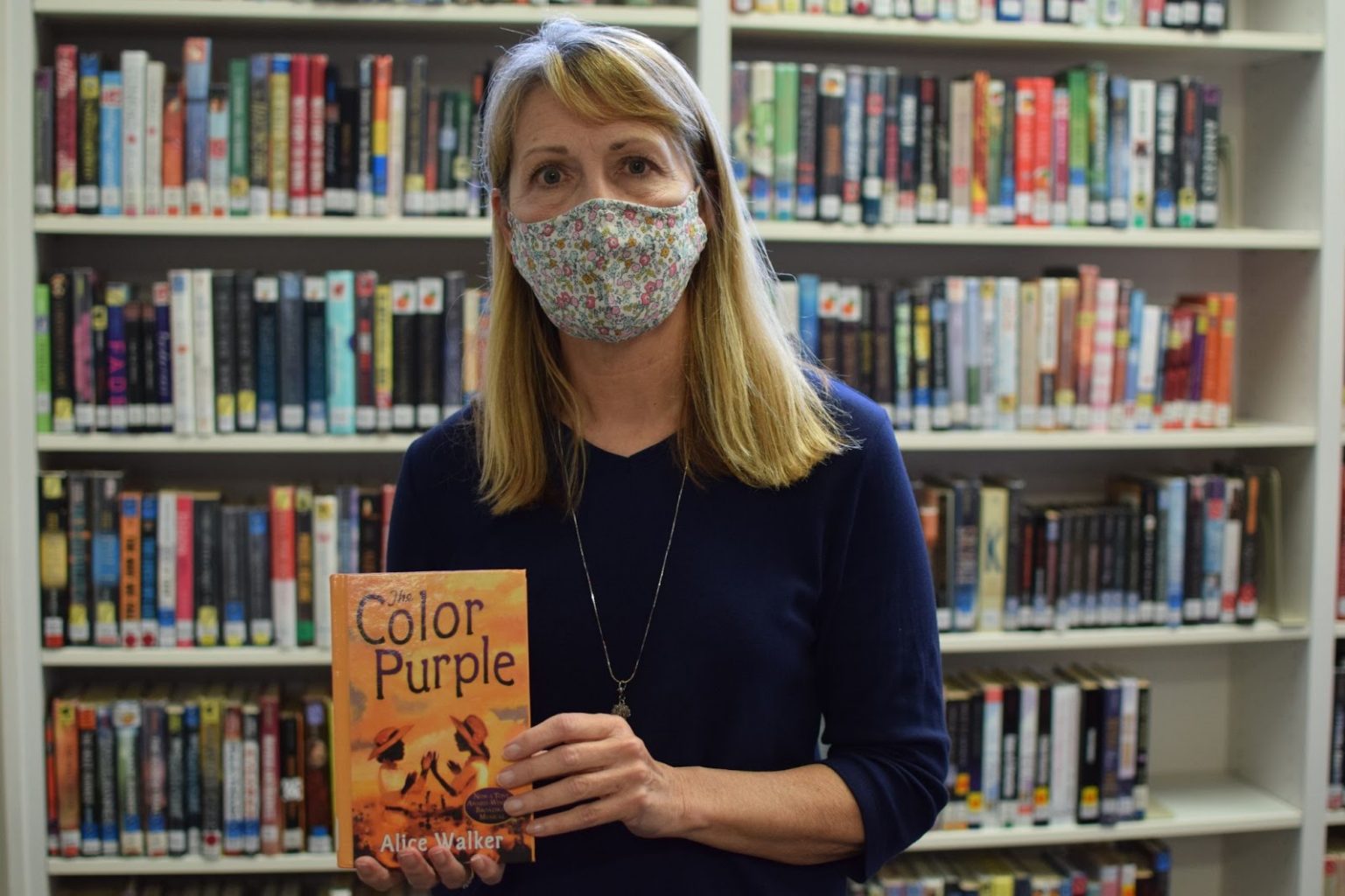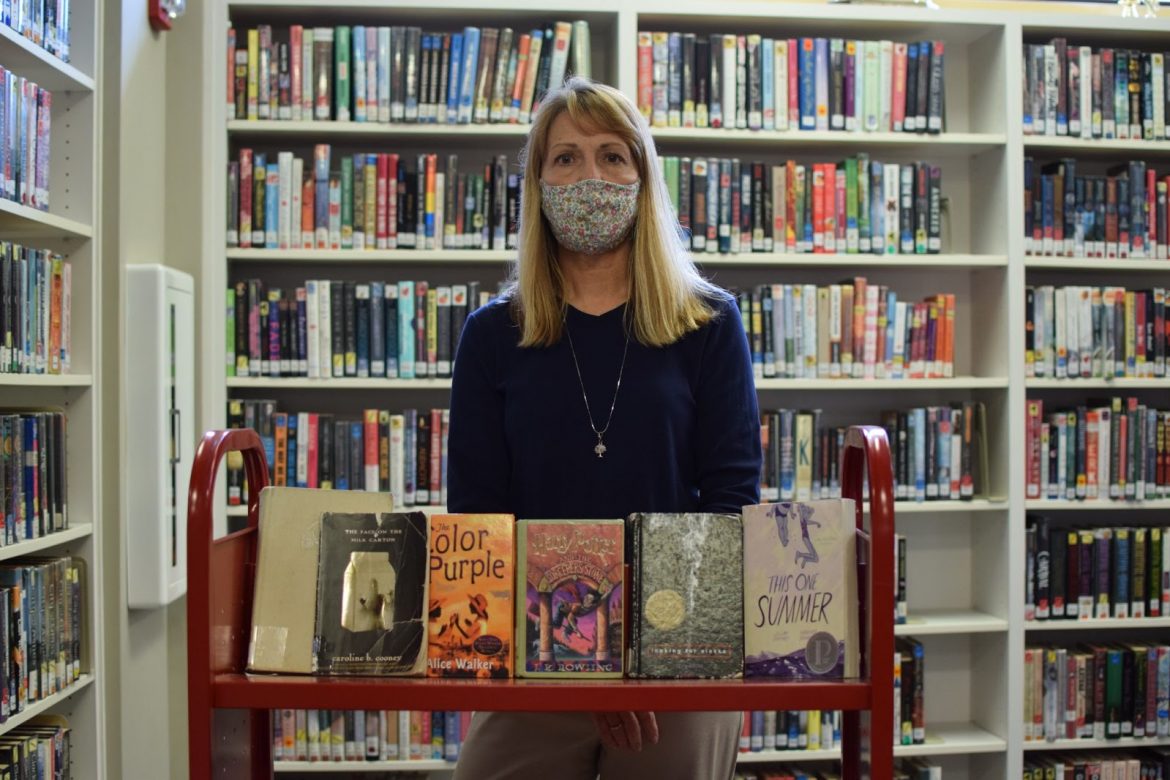Clarke Central High School Media Specialist Mary Ann Sullivan stands behind a cart of books that have all been either challenged or banned in schools in Georgia. Senate Bill 226, which was proposed in late March, outlines a new process for the decision-making of the selection and access to books in the school library. “As Library Media Specialists, we respect the opinions of any person or organization that questions the appropriateness of materials housed within our library. We do have a process in place so that a fair decision is made to keep or remove a title,” Sullivan said. “(Right now,) the local School Media Committee reevaluates the selection based on reviews, selection aids (and) educational purpose and determines the value of the material as a whole, not (just) based on a selected passage.” Photo by Luna Reichert
In late March, Senate Bill 226 was proposed and would replace the current process of parents objecting to school reading materials such as books, websites or films.
The bill would change book challenge decisions so that they are made solely by principals and a designee, and they would have seven working days to review said challenged materials and determine whether or not they meet the standard proposed in the bill of being “harmful to minors”. If the board rejects the parent’s appeal, the school has to post the material on its website, where it would have to remain for four years.
“(Senate Bill 226) didn’t start off as this particular bill. It shifted from its original purpose which was targeting a specific book on a specific database that had some LGBTQ (content) in it. (The senators) weren’t getting anywhere with that, and it shifted into this particular bill because they were trying to get their cause to go through. It’s the underpinnings to this bill that really concern (the Georgia Library Media Association (GLMA)) and (organizations) like that,” GLMA President Martha Bongiorno said.

A photo of the cover of “The Handmaid’s Tale” by Margaret Atwood is held in the Clarke Central High School library on May 6. This classic novel is one that has been challenged and in some cases banned in schools across the country for profanity, vulgarity and sexual overtone. “Banning a book from a library is an extreme measure that should not be rushed and should not fall on one person. When a book is removed for all readers, it may have been the very book that someone needed to see themselves (to) cope with an issue they are facing, or see a perspective they haven’t thought of before,” David C. Barrow Elementary School Media Specialist Andy Plemmons said. Photo by Elena Webber
According to an article from the Atlanta Journal-Constitution, the bill began gaining public support because some parents objected to “The Handmaid’s Tale” by Margaret Atwood, which has endured national controversy over the years.
“The bill came out of some parental concerns, then the parents didn’t like the current process (and) they knew a representative (so) they went to them and said, ‘We need a new process, can you make a bill?’” GLMA Advocacy Chair Amanda Lee said. “This has been an issue that’s been kind of festering with a small group of parents, and they’re gonna keep pushing until they get what they want in terms of policies.”
Current Georgia Department of Education rules require districts to create policies and guidelines for selection of instructional materials, and the process for hearing concerns regarding those materials goes through a local School Media Committee. When this happens, the board is required to read the entire book and determine the author’s point of view, the educational value, if it meets the needs of the school community and other aspects of the work.
“The School Media Committee, which consists of grade level representatives, administration and sometimes students (or) parents all read the material being challenged. Then the committee meets to discuss the challenge,” Barrow Elementary School Media Specialist Andy Plemmons said. “They consult reviews, selection principles and criteria, district goals and can request additional information from the parent. All of this information is weighed together to decide if the book should be removed. The book remains in circulation throughout this whole process. The committee delivers their decision and the parent can accept the decision or file an appeal to the District Media Committee where a similar process occurs.”
Executive Director of the Foundation for Excellence and Public Education CJ Amason, who has had four children go through CCSD schools, has asked for her children to be exempted from reading certain material because they were too young.
“One (example) was when my kids, who are 25 now, were young and they were going to (read) Harry Potter (in their class). The part about Harry Potter (that I wasn’t okay with) — which I had read the whole first (book before) to see (if it was okay for my kids to read), and I know it’s very popular and my kids have all read them since then — but his parents are murdered at the beginning, and I just thought that was too dramatic for my young kids,” Amason said. “They were in the second grade. To have a story that begins with a child’s parents being murdered, I just didn’t really want my second graders to (read) that.”
At CCSD schools, a parent with a complaint will fill out a Request for Reconsideration of Materials that requires them to cite page numbers and reasons they feel the book should be banned.
“Currently, the reconsideration policy we have in place is effective. It gives the person or organization a clear process to submit a complaint and it is taken into consideration by a group of people from the school community,” Clarke Central High School Media Specialist Mary Ann Sullivan said. “We have a population with many different opinions and interests and a decision to remove a title should be put before a committee of people with varied backgrounds.”
“We have a population with many different opinions and interests and a decision to remove a title should be put before a committee of people with varied backgrounds.”
— Mary Ann Sullivan,
Clarke Central High School Media Specialist
“The local library community was very surprised that this legislation was being considered because you’re putting an important decision on the shoulders of one person. Can one person be objective in their decision-making? When we accept a reconsideration form, we are essentially being informed of one person’s opinion,” Sullivan said. “Our society includes people with many different backgrounds and opinions. No one person should choose for us what is appropriate for our collection.”
Plemmons agrees with Sullivan and thinks that banning a book from a library is an extreme measure that shouldn’t be rushed or fall on one person.
“Principals have a lot on their plate and aren’t trained in library selection. In general, they are not as familiar with the library collection as the media specialist and the reasons why each book was placed into the collection,” Plemmons said. “I think some principals would take the task of banning books seriously and put in as much time as they could, but many would likely make a rushed decision due to the demands of their job. Allowing the media specialist in collaboration with the media committee to follow the process is fair to both the book, the school full of readers and the family making the complaint.”
According to GLMA Advocacy Chair Amanda Lee, the seven-day timeline to make a decision that is proposed in the bill is problematic and unreasonable. For Lee, when the committee reviewing the book reads the book cover to cover in response to a challenge, the seven-day period doesn’t allow for that amount of investigation.
“I had a challenge last year, and it took us about a month (to deliberate) because I had to order copies of the book, or people had to get them from public libraries so that everybody could read it (and) research everything,” Lee said. “It’s not a fair way to review a book, and it could lead to more books being banned because of the process, rather than because of the content of the book.”
At Barrow Elementary School, the library has a set of selection principles and criteria when deciding what books to make available to students.
“I think the terms ‘obscene,’ ‘inappropriate’ and ‘harmful to minors’ are dangerous words because they can be interpreted in many different ways,” Plemmons said. “When I choose a book for the library, it is for a range of readers Pre-K to fifth grade. I strive to put books in the library that are developmentally appropriate for that age range but explore a variety of topics, beliefs and cultures.”

Clarke Central High School Media Specialist Mary Ann Sullivan stands with the book “The Color Purple” by Alice Walker in the CCHS Media Center on May 6. “The Color Purple” has been challenged multiple times since it published and banned from school libraries across the country for many different reasons including religious objections, homosexuality, violence, rape, incest and more. “When we choose an acquisition for our collection, we follow the guidelines for CCSD high school students. We always use review resources,” Sullivan said. “These resources give us specific grade levels or age levels that the title is appropriate for, such as grades nine-12 (or) ages 15-18. As long as a review gives these ranges, we feel comfortable to include in our collection. Seldom do reviews specifically tell us if there is profanity, violence, sexually explicit scenes, etc.” Photo by Elena Webber
Sullivan states that how she defines something inappropriate or obscene is her personal opinion and is private, but she puts those aside when selecting books to avoid censorship. For CCHS, the media specialists use review resources when choosing what books go in the library such as the School Library Journal, Kirkus Reviews, Booklist or NoveList database.
“What’s inappropriate or obscene to one person may not be to the next. On any given day at CCHS, you will hear profanity from some students and none from others. What students watch on social media or TV also varies with what is acceptable to them personally,” Sullivan said. “At the high school level, we have immature eighth graders coming from middle school and 18 year olds who will be entering the workforce, college or military within a matter of months. We have to consider a very wide ability and maturity level with our readers. High school students should be mature enough to know what is appropriate for them.”
Senior Sophie Caillault believes it’s unreasonable to ban a book for everyone based on a few people’s views.
“Sometimes you have to be uncomfortable to learn and grow as a person and banning those (kinds of books), making them taboo, doesn’t help people learn or improve themselves or improve society. In some cases, “banning” something can protect people from really psychologically damaging things, but I think that’s mostly age dependent, with some exceptional circumstances related to trauma or mental health,” Caillault said.
Amason holds that a parent’s right to control what media their child consumes is of utmost importance and parent’s concerns should be addressed. However, she also agrees that the power to remove that content for all students is a complex situation.
“I do have a gut reaction to banning or pulling certain things for everyone because I might have a different view for my children than somebody else would. But if the bill really is about just codifying and streamlining a process for complaints and review of materials to deem whether or not they are appropriate or not, then I’m okay with that,” Amason said. “I like parents to have a lot of decision over their own children, (but) I don’t know how much I like for other parents to have that decision making process for my kids.”
According to Bongiorno, the two major issues with the bill revolve around copyright and censorship. In response to the section of the bill that states if the book is deemed “not harmful” for minors and kept in the curriculum, it is to be posted in an easily accessible location online for four years, Bongiorno asserts that one can’t take a book and put it online completely without violating copyright.
“You’re literally saying ‘This is inappropriate, and we shouldn’t have this out to the world, and we shouldn’t subject our children to this stuff,’ and then you’re literally putting it on the internet for people to go read and see,” Bongiorno said. “Guess what your kids are going to be doing because you told them it was inappropriate? They’re going to read it, they’re going to go see it. Even if you try to navigate that copyright issue and you put it behind a closed wall where you have a login to be able to observe it and see it and stuff, kids are resilient, resilient creatures. They are going to figure out what their parents’ login is, they’re going to hack the system and it’s going to end up on Snapchat or Instagram or whatever.”
“Even if you try to navigate that copyright issue and you put it behind a closed wall where you have a login to be able to observe it and see it and stuff, kids are resilient, resilient creatures.”
— Martha Bongiorno,
GLMA President
Caillault suspects the bill will affect a large number of the books included in the literature curriculum.
“My biggest concern regarding this bill is not what kids want to read—it’s what materials their teachers would and wouldn’t be allowed to discuss in class,” Caillault said. “School is meant to expand our horizons and expose us to a variety of things that we might not be able to learn on our own, and if teachers can’t include certain exposures in their curricula, then the students don’t get as comprehensive of an education. They won’t come out as critical or as knowledgeable.”
Overall, Plemmons opposes the bill and believes, if passed in the future, it would limit or restrict access to books that could help students grow as people.
“I think that this bill ignores the years of training that media specialists have had to select library collections that meet the needs of their community and beyond. It assumes that a process doesn’t already exist to respectfully reconsider a material,” Plemmons said. “I think that it is a quick way to remove access to books just because one person disagrees with them. In doing that, this bill could remove the very books that some readers might need to understand something in the world. Books are one of the safest ways to learn about the complexities of the world.”
